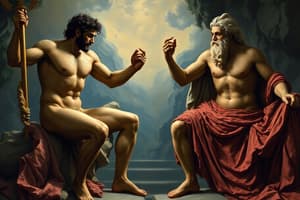Podcast
Questions and Answers
In which era did Athens begin to develop a significant mythology centered around Theseus?
In which era did Athens begin to develop a significant mythology centered around Theseus?
- 300s B.C.
- 500s–400s B.C. (correct)
- 1600–1200 B.C.
- 1000–900 B.C.
What does the name 'Thēseus' translate to in English?
What does the name 'Thēseus' translate to in English?
- Foundation Maker (correct)
- Bravest Warrior
- Hero of Mycenae
- King of Athens
How was Theseus viewed by Athenians of the 400s B.C.?
How was Theseus viewed by Athenians of the 400s B.C.?
- As a real historical figure deemed mythical (correct)
- As the primary ruler of ancient Greece
- As an entirely mythological creation
- As a fictional character with no historical basis
What motivated Athenian myth-making around Theseus, similar to the perception of King Arthur in the Victorian era?
What motivated Athenian myth-making around Theseus, similar to the perception of King Arthur in the Victorian era?
Which historical figure's era correponds to the peak of Athenian power and the promotion of Theseus?
Which historical figure's era correponds to the peak of Athenian power and the promotion of Theseus?
What was one specific purpose of Athenian propaganda regarding Theseus?
What was one specific purpose of Athenian propaganda regarding Theseus?
During what time period did Theseus's myth undergo significant revisions?
During what time period did Theseus's myth undergo significant revisions?
Which city is primarily associated with the myths surrounding Theseus?
Which city is primarily associated with the myths surrounding Theseus?
What ultimately happens to Theseus after he seeks refuge on the island of Scyros?
What ultimately happens to Theseus after he seeks refuge on the island of Scyros?
Which event marks the beginning of the earliest layer of the Theseus myth?
Which event marks the beginning of the earliest layer of the Theseus myth?
In which layer of the myth does Theseus begin to resemble the hero Heracles?
In which layer of the myth does Theseus begin to resemble the hero Heracles?
Who rescues Theseus from the Underworld in the usual version of the myth?
Who rescues Theseus from the Underworld in the usual version of the myth?
Which element primarily characterizes the third layer of the Theseus myth?
Which element primarily characterizes the third layer of the Theseus myth?
How does Theseus's personality appear throughout the different layers of his myth?
How does Theseus's personality appear throughout the different layers of his myth?
What is the significance of Theseus's adventure with Phaedra and Hippolytus?
What is the significance of Theseus's adventure with Phaedra and Hippolytus?
What are the consequences of Theseus and Peirithoüs's hubris in the Underworld?
What are the consequences of Theseus and Peirithoüs's hubris in the Underworld?
Which action did Theseus take that led to the splitting of his myth into different character portrayals?
Which action did Theseus take that led to the splitting of his myth into different character portrayals?
What does the 'synoecism' associated with King Theseus represent?
What does the 'synoecism' associated with King Theseus represent?
What was the primary purpose of developing the myth of Theseus in relation to Heracles?
What was the primary purpose of developing the myth of Theseus in relation to Heracles?
How was Theseus characterized throughout his mythological adventures?
How was Theseus characterized throughout his mythological adventures?
Which of the following actions best exemplifies Theseus' hubris?
Which of the following actions best exemplifies Theseus' hubris?
What ultimately happened to Peirithoüs as a result of his actions with Theseus?
What ultimately happened to Peirithoüs as a result of his actions with Theseus?
What moral dilemma is present in Theseus' character as mentioned in the myth?
What moral dilemma is present in Theseus' character as mentioned in the myth?
Which of the following statements about Theseus and his romantic pursuits is true?
Which of the following statements about Theseus and his romantic pursuits is true?
What was the consequence of Theseus' attempt to kidnap Helen?
What was the consequence of Theseus' attempt to kidnap Helen?
Which detail illustrates Theseus' punishment in the Underworld?
Which detail illustrates Theseus' punishment in the Underworld?
How did Heracles intervene in the fate of Theseus in the Underworld?
How did Heracles intervene in the fate of Theseus in the Underworld?
What happened to Theseus upon his return to Athens after his time in the Underworld?
What happened to Theseus upon his return to Athens after his time in the Underworld?
In what way did Theseus’ actions during adulthood contradict his role as a wise king?
In what way did Theseus’ actions during adulthood contradict his role as a wise king?
Which statement best describes the relationship dynamics among Theseus, Peirithoüs, and the goddess Persephone?
Which statement best describes the relationship dynamics among Theseus, Peirithoüs, and the goddess Persephone?
What overarching theme is reflected in Theseus' mythological narrative?
What overarching theme is reflected in Theseus' mythological narrative?
What characterized the portrayal of Theseus as compared to Heracles in Greek mythology?
What characterized the portrayal of Theseus as compared to Heracles in Greek mythology?
Flashcards
Who is Theseus?
Who is Theseus?
The only significant mythical hero associated with the city of Athens.
Why is Theseus unique?
Why is Theseus unique?
Athens was not a major kingdom during the Mycenaean period (1600-1200 B.C.), thus it lacks prominent heroes in Greek mythology.
What is Athenian Propaganda?
What is Athenian Propaganda?
The Athenian government, particularly during the 5th and 4th centuries B.C., shaped and embellished stories about Theseus to fit their own agenda.
What does the name 'Theseus' imply?
What does the name 'Theseus' imply?
Signup and view all the flashcards
How was Theseus viewed by Athenians?
How was Theseus viewed by Athenians?
Signup and view all the flashcards
How did Athenians believe in the myth?
How did Athenians believe in the myth?
Signup and view all the flashcards
What was the motive for Athenian Propaganda with Theseus
What was the motive for Athenian Propaganda with Theseus
Signup and view all the flashcards
Theseus's Inconsistent Personality
Theseus's Inconsistent Personality
Signup and view all the flashcards
Early Theseus: Crete and Labyrinth Adventures
Early Theseus: Crete and Labyrinth Adventures
Signup and view all the flashcards
Theseus: Imitating Heracles
Theseus: Imitating Heracles
Signup and view all the flashcards
Theseus: The Wise King
Theseus: The Wise King
Signup and view all the flashcards
Theseus and the Amazon Queen
Theseus and the Amazon Queen
Signup and view all the flashcards
Theseus and Peirithoüs in the Underworld
Theseus and Peirithoüs in the Underworld
Signup and view all the flashcards
Heracles Rescues Theseus
Heracles Rescues Theseus
Signup and view all the flashcards
Theseus's Underworld Journey: Timing
Theseus's Underworld Journey: Timing
Signup and view all the flashcards
The Tragedy of Phaedra, Hippolytus, and Theseus
The Tragedy of Phaedra, Hippolytus, and Theseus
Signup and view all the flashcards
Theseus's Downfall: Betrayal and Murder
Theseus's Downfall: Betrayal and Murder
Signup and view all the flashcards
Theseus's Contradictory Personality
Theseus's Contradictory Personality
Signup and view all the flashcards
Hubris
Hubris
Signup and view all the flashcards
Theseus as Athenian Hero
Theseus as Athenian Hero
Signup and view all the flashcards
Dorian-Ionian Rivalry
Dorian-Ionian Rivalry
Signup and view all the flashcards
Theseus Mimicking Heracles
Theseus Mimicking Heracles
Signup and view all the flashcards
Kidnap of Persephone
Kidnap of Persephone
Signup and view all the flashcards
Theseus's Romantic Life
Theseus's Romantic Life
Signup and view all the flashcards
The Amazons
The Amazons
Signup and view all the flashcards
Peirithoüs's Punishment
Peirithoüs's Punishment
Signup and view all the flashcards
Aetiology
Aetiology
Signup and view all the flashcards
Theseus's Loss of the Throne
Theseus's Loss of the Throne
Signup and view all the flashcards
Abduction of the Amazon Queen
Abduction of the Amazon Queen
Signup and view all the flashcards
Theseus's Double Nature
Theseus's Double Nature
Signup and view all the flashcards
Theseus vs. Heracles
Theseus vs. Heracles
Signup and view all the flashcards
Study Notes
Theseus: A Mythical Hero of Athens
- Theseus is the only major mythical hero of Athens, though Athens wasn't a major kingdom during the Mycenaean era (1600–1200 BC).
- The myths surrounding heroes like Theseus are often rooted in important kingdoms of that era, such as Mycenae and Thebes. Athens's lesser importance during that period led to fewer myths connected to it.
- Athenian accounts of Theseus show signs of later invention and propaganda, especially from the 500s to 400s BC when Athens was a powerful city-state.
- The name "Theseus" means "Establisher" or "Foundation Maker," perfectly aligning with Athenian myth-making aimed at showcasing Athens's historical importance.
- Athenians of the 400s BC saw Theseus as a legendary figure, akin to King Arthur to Victorians of the 1890s, foreshadowing the future greatness of Athens.
- There is a historical layer to the myth, potentially dating as far back as 1400 BC, as well as later additions.
Athenian Propaganda and Theseus
- The development of the Theseus myth mirrors the rise of Athenian propaganda in the 5th and 4th centuries BC.
- Athens created a hero comparable to Heracles, a Dorian propagandistic hero prevalent in Sparta.
- The "Dorian-Sparta vs. Ionian-Athens" rivalry in the 5th-4th BC centuries led to the use of Theseus as a counter-hero.
- Theseus' adventures sometimes mirrored those of Heracles, intentionally, according to the author.
- Theseus is sometimes referred to as "a second Heracles."
A Complex Personality
- The Theseus myth spans his lifespan (approximately 60 years), with inconsistent behaviour.
- Theseus's actions sometimes include valor, shrewdness, nobility; other times, recklessness and brutality.
- Theseus was sometimes presented as a wise king and also as someone involved in reckless adventures, like the attempt to kidnap Persephone in the Underworld.
- The inconsistencies can be explained by the myth evolving as it gained importance.
Theseus's Adventures & Character Flaws
- Theseus is a "Don Juan" figure in Greek mythology, romantically involved with and abandoning multiple women, including Cretan royal sisters, an Amazon queen and a Spartan princess.
- The myth portrays these acts as sometimes questionable, indicating flaws, yet he was still romanticized as the ideal male figure of Athens.
- His abduction and enslavement of the mythical Amazon queen, which resulted in an attack against Athens.
- His involvement in the disastrous plan to kidnap Persephone.
- Theseus and Peirithous' punishment in the Underworld.
Layers of the Myth
- Early layer (?1400–600 BC) includes the Minotaur, Ariadne, establishing Athenian rule, kidnapping of Helen, and the Persephone abduction.
- "Imitating Heracles" layer (circa 550–500 BC) developed parallel adventures to Heracles, like destroying bandits, capturing a boar, bull and abducting Amazons).
- "Wise King" layer(circa 500–400 BC) emphasizes Theseus's rule of Athens and welcomed suppliants, and his role in battles.
Theseus's Later Life and Death
- Theseus is dethroned by a usurper.
- While in the Underworld, his mother Aethra is kidnapped.
- Theseus takes refuge in Scyros and is murdered by his host.
Studying That Suits You
Use AI to generate personalized quizzes and flashcards to suit your learning preferences.




